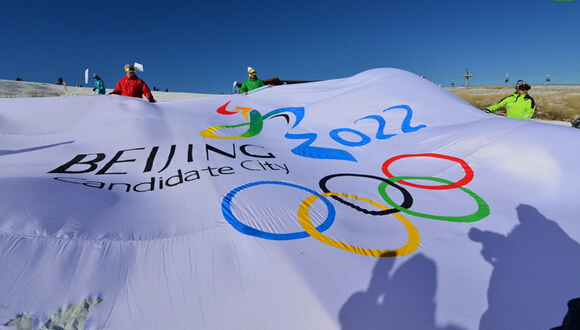Clinching the winter olympics will provide hefty economic opportunities for Beijing and its surrounding regions, analysts say.
Seven years after the capital successfully hosted the summer olympics,Beijing's victorious winter olympic bid last Friday has triggered a string of investment in venues, transportation and environment.
According to Beijing's bid committee, the budget for the winter games is projected at 1.56 billion US dollars, with a further 1.51 billion used on infrastructure renovation.
With a rich legacy left by the summer olympics, China plans to re-use the existing 11 venues and only needs to build a new rink for speed skating, effectively easing possible problems of facilities being left idle after the games.
On transportation, a high-speed railway linking Beijing and Zhangjiakou, where some of the skiing events will be held, is expected to be constructed around 2019 to cut travel time between the two cities to 50 minutes.
As air quality and snow conditions are regarded as two of the major challenges for Beijing's Winter Olympic Games, investments will be made to address the issue.
Beijing began implementing a five-year plan from 2013 that cost 130 billion US dollars to upgrade heating systems, cut car emissions and close heavy-polluting plants. Neighboring metropolitan Tianjin and Hebei province have adopted similar measures.
A second five-year plan to further improve air quality is being studied, according to Beijing Mayor Wang Anshun.
The policies are already producing notable effects. Concentration of PM2.5, airborne particles measuring less than 2.5 microns, has been reduced by 15.2 percent year-on-year in the first half of the year in Beijing, according to statistics from the Beijing Municipal Environmental Protection Bureau.
According to an existing plan, the city aims to cut PM2.5 density by 20 percent by 2017, compared with 2012. However, an environmental official of the city predicted the reduction could reach 25 percent.
In the co-host city Zhangjiakou, the State Council has approved a renewable energy demonstration zone that aims to fully rely on renewable energy to provide electricity and heating for the Olympic center and venues.
Chen Jian, deputy head of the China Society of Economic Reform, said Beijing's successful bid for the Winter Olympics will significantly promote infrastructure and environment development in the Beijing-Tianjin-Hebei region, as well as development of many other industries.
SPORTS INDUSTRY
On the back of the Winter Olympics, the Beijing municipal government is looking at fostering sports-related industry as a new growth driver to power its economy.
According to the government plan, Beijing aims to bring the value of its sports industry to 300 billion yuan by 2025, and develop world-class sports enterprises.
To encourage the industry, the city government plans to set up an investment fund to guide social capital into sports.
Chen forecast by 2025, China's sports industry will be valued at 800 billion U.S. dollars, generating around 600,000 new jobs.
GROWTH TRANSFORMATION
Apart from the massive opportunities for Beijing, the 2022 Winter Olympics will also offer unprecedented benefits to its less developed neighbors and help them upgrade growth models.
Chongli County under Zhangjiakou city, where about 50 gold medals will be on offer for snow events in 2022, has evolved from a small, unknown place where residents relied on mining for income into a hot tourist destination for skiing fans.
Last year, the county received more than 2 million tourists that brought related revenue to 1.41 billion yuan.
The Winter Olympic Games are expected to further bolster local tourism and the skiing industry. Zhangjiakou expects the event to generate 350 billion yuan of investment and create 200,000 jobs for the city.
Taken from China Daily
